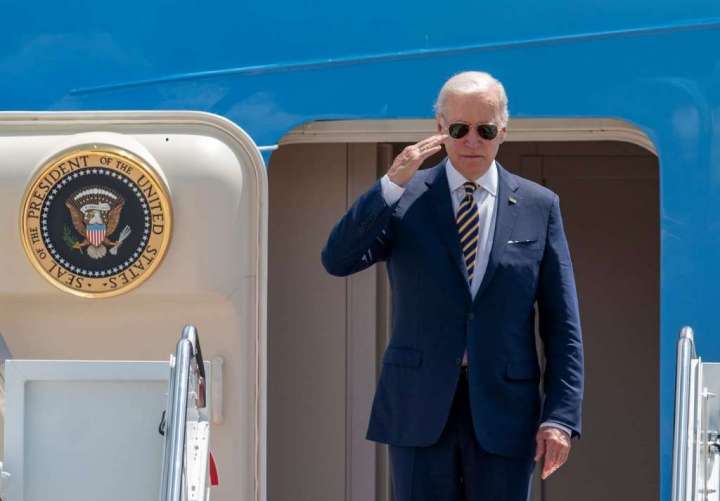President Biden is traveling this week to Asia to project U.S. diplomatic and economic power in a region that has been rattled by the blunders of America’s two most powerful rivals, Russia and China.
Biden seeks a new opening in a rattled Asia

China is having its own internal troubles at the same moment that its chief ally is caught in a war of attrition in Ukraine. President Xi Jinping’s campaign to create “common prosperity” has backfired, administration officials believe. Chinese growth is slowing, capital is fleeing the country and internal dissent is increasing — even as a new wave of the pandemic has Shanghai and other major cities in lockdown.
“This is an opportunity for the United States to get off the back foot,” says Stephen Hadley, who served as national security adviser for President George W. Bush. “Putin has delivered a strategic blow to Russia by his failed effort to absorb Ukraine, and Xi by his policies has derailed the Chinese juggernaut.”
Follow David Ignatius‘s opinions
FollowBiden’s trip to Asia will offer a powerful tableau of the United States’ greatest global strength, which is its network of partnerships with strong democracies. Biden is scheduled to visit with South Korea’s new president and then with the leaders of India, Japan and Australia, who are America’s partners in the so-called Quad.
Because Ukraine will be on everyone’s mind, the usual gaps between transatlantic and Asia-Pacific policies might be dissolved by common opposition to aggression. “These may be two theaters, but there’s one operating system strategically,” argues Kurt Campbell, who coordinates Asia policy for the National Security Council.
Biden’s Asia trip will launch a two-month roadshow of diplomacy in which Biden will take his case for global partnerships to leaders from Asia, Latin America, Europe and the Middle East. Because it’s a moment when both Beijing and Moscow are suffering from severe, self-inflicted problems, administration officials feel that they have the wind at their backs for a change.
China’s recent economic difficulties form an unexpected backdrop for the trip. Reversals in the property, technology and financial sectors, plus new covid-19 lockdowns, led International Monetary Fund economists to lower their growth forecast for China this year to 4.4 percent. Some analysts think growth will actually be much slower, and that at current rates, the Chinese economy might not surpass that of the United States by the end of this decade, as many had expected — or perhaps not ever.
Kevin Rudd, a China scholar and former Australian prime minister, summarized Beijing’s difficulties in a speech this month to the Asia Society, which he heads. Xi tried to dictate “common prosperity,” by cracking down on highflying tycoons. The resulting economic turmoil was so great that in recent months, the economic buzzword for newly centrist Chinese officials has become “stability,” Rudd wrote in his prepared remarks.
Investors were already fleeing Chinese stocks and bonds when the pandemic struck again this year, shattering Xi’s zero-covid policy. For a country that touts the managerial competence of its authoritarian system, it’s not a pretty picture. `
Biden plans to announce a new Indo-Pacific Economic Framework, which will seek to establish common digital standards, supply-chain cooperation and other shared norms. It’s not a “trade agreement” like the Trans-Pacific Partnership that Democrats abandoned in 2016, ceding the field to China, which quickly created its own multilateral group. But the IPEF, as the administration has dubbed it, provides what one official calls “an affirmative, positive economic vision for the most strategically consequential region of the world.”
Administration officials expect that at least 10 Asian countries will agree to join the IPEF negotiations. That will include India, a regional powerhouse, as well as other major Asian economies. The IPEF isn’t as broad as the TPP was, but one former trade official notes that it’s “a mechanism for getting the U.S. back to the table, to engage, to show leadership on issues that matter.” That’s a step forward from the trade phobia that has rattled the administration.
A shadow over the Asia trip will be North Korea. U.S. officials fear that President Kim Jong Un might be planning a missile launch, or even a nuclear test, during Biden’s visit to the region. A nuclear test would provoke a full-blown crisis with Pyongyang, even as Kim struggles to contain a covid outbreak that one official said is “tearing through the country.”
A sign of Beijing’s disorientation in this moment of upheaval: When the White House warned Beijing this week about the possible North Korean test and proposed a common effort to help deal with the covid outbreak there, sources say the Chinese didn’t respond. They were, so to speak, on the back foot.






